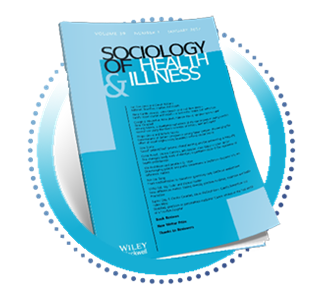New Editorial Team Introduction: Sociology of Health & Illness

We are really pleased to be taking over the editorship of Sociology of Health and Illness (SHI) and are excited to take the journal forward over the next few years, working closely with the Editorial Board and publishers, Wiley, as well as our authors and reviewers. We thank the previous editorial team at Cardiff University – Ian Rees Jones, Gareth Williams, Davina Allen, Joanna Latimer, David Hughes, Eva Elliot and book review editors Gareth Thomas and Rebecca Dimond and, of course, Sarah David, editorial manager – for their extremely hard work over the years and for their part in ensuring a smooth hand-over to us as the new editorial team.
The journal is held in very high esteem by ourselves and our academic peers and we will not be making changes for the sake of it. Instead, we will build on the work of the previous editorial team, protecting the heritage of medical sociology that is at the heart of the journal. However, we also recognise the importance of interdisciplinary research on health and illness and will continue to reflect this in what we publish, encouraging authors to be more explicit about how they work with medical sociology at the boundaries of other cognate disciplines and fields – for example, disability, gerontology, health and social care, public health, and Science and Technology Studies (STS) – to explore health, illness, and medicine.
We will remain flexible about the issues covered in the journal to ensure the focus remains on excellent research rather than pre-given topics. However, we hope and expect that authors will continue to be interested in submitting papers on health inequality in all its forms, encompassing social class, gender, sexuality, ethnicity and ageing; on critical engagement with healthcare and health policy; on debates about sociology of and in medicine; and on using social theory to explore and explain micro, meso and macro level issues of health and healthcare. In addition, we want to develop the Journal to reflect the increasingly global, super diverse, precarious, ageing and technologised world that we live in and study, seeking strong conceptual and empirical sociologically-informed papers to achieve this. We will work closely with our international advisory board to identify high-quality sociological work in specific countries or regions currently underrepresented in the journal in order to encourage a more global understanding of the sociology of health and illness.
We want to encourage the Journal’s reach to extend beyond the academic community to practitioner, policy, voluntary and community sectors. One way we can do this is to encourage the publication of research that seeks to influence such communities directly, particularly through the use of creative research methods including methods for public engagement and impact. We will make the very best use of digital tools to disseminate our published research to these wider communities. Working with the Journal’s social media expert, Ellie Byrne, we will continue to disseminate SHI output through twitter and other social media, as well as developing podcasts, author video blogs and other online content designed to extend the reach and impact of research.
We will continue to organise related papers into special sections and virtual special issues, particularly where we feel we can attract attention to policy-related topics and debates. We will also continue to encourage edited collections through the annual SHI monograph series for which there is an annual Call. We welcome ideas for all these initiatives from across the medical sociology community.
We recognise that the continued production of a high-quality journal is a collective effort and we will work closely with all involved in delivering this. We will continue to support new authors through SHI’s established Mildred Blaxter New Writer’s Prize, awarded annually to the best article published by a novice writer, for which we encourage all eligible authors to apply. The synergy between reviewers and authors is also something we recognise and want to encourage. Good reviewing supports good writing, and vice versa, and we wish to explore ways to exploit this combined effort to enhance the quality of papers still further. As a first step, we have arranged to run a workshop for current and new SHI reviewers at MedSoc’s 2019 conference in York where we will seek to understand their experiences, concerns and suggested improvements to ensure we continue to receive reviews that are both timely and constructive.
As a team, we feel well-placed to deliver to the agenda we have mapped out. Together, we encompass a broad range of expertise, holding medical sociology at its core. Karen Lowton’s expertise crosses the boundaries of medical sociology, gerontology, health service research and palliative care, with methodological interests around the ethics of conducting sensitive research with vulnerable people. Flis Henwood works at the boundary of medical sociology and STS to examine and theorise the relationship between information, technology and care, the everyday experiences of digital health, and co-design for digital health. Catherine Will’s expertise centres around the negotiation of medical and patient knowledge, evidence and policy, domestic and consumer health products and practices, preventive turn and public health. Sasha Scambler’s research is grounded in social theory, disability and long-term conditions, and healthcare delivery. Gillian Bendelow’s expertise focuses on mental and emotional health, chronic pain and ‘contested conditions’, health promotion and integrated models of healthcare. Catherine Theodosius’ research focuses on emotional labour, considering this in the context of practitioner resistance, bringing together sociological, psychological and neuroscientific approaches in theorising the practice and experience of nursing. Ben Fincham’s expertise lies in mental health and wellbeing, critiquing and developing these concepts in the disparate contexts such as suicide and fun.
The team is joined by two book review editors: Shadreck Mwale, whose research focuses on health inequalities, global health and the intersections of medical technological innovations and society and their attendant ethical issues, and Gillian Love, whose research focuses on the politics of motherhood, childbirth, pregnancy, abortion and the body, feminist theory and cultural class analysis. We are delighted to be working alongside Sarah David, the Journal’s extremely experienced editorial manager, who joins us from the previous editorial team. Sarah has key roles in journal production, the SHI website and enhancing the reach and impact of the journal, as well in the role for which most of us will know her, supporting authors through the submission and review process to the eventual publication of their articles.
Karen Lowton & Flis Henwood, Joint Editors-in-Chief, Sociology of Health & Illness
For full details of the new team, along with the Editorial Board and International Advisory Board, see here.






1728-4457/asset/PopulationCouncilLogo.jpg?v=1&s=03074651676b98d6b9d0ef1234bd48fe7ff937c3)
